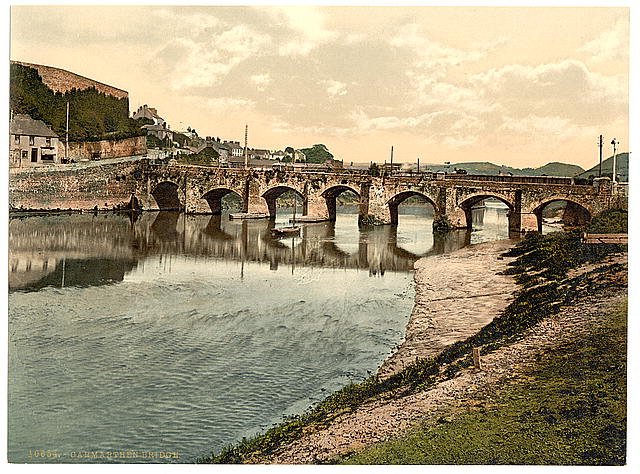Note: This article has been excerpted from a larger work in the public domain and shared here due to its historical value. It may contain outdated ideas and language that do not reflect TOTA’s opinions and beliefs.
From Glimpses of Welsh Life and Character by Marie Trevelyan, 1893.
Since the days of the old Radical and Tory, striking changes have taken place in the manner of locomotion.
The way in which journeys were formerly taken in Wales, would astonish ladies of the present day. Frequently, a horse had to be borrowed, and then both man and woman had to mount it, the wife seated on a pillion behind her husband, to whom she was obliged to cling tenaciously. Even then there was a risk, for sometimes the horse objected to the double load, and kicked immoderately, or threw the riders.
A very old man, relating his own memories of the past, said, "My wife hired a horse, and about seven o'clock we set out on our journey to Cardiff. As we were riding through St. Nicholas in the Yale, at less than the footpace of a quick walker, the horse stood still, and continued kicking up until we both were off and soon down in the mud. We were not hurt, but my wife and I had to go to the Three Tuns to clean ourselves. In out of the way places, where the roads were very bad, oxen were put to draw carts, in which people were able to pass through the mud that was too deep for horses to go into it. In those days it was nothing to meet half-a-dozen men carrying their wives pick-a-back to or from chapel, when the roads were in a very terrible condition. I have often seen the parson's wife going to a dinner-party at the squire's. She had no carriage not she and the roads were in some places over ankle deep with mud. So she went on the back of her manservant. And if it rained in the summer, she would go pick-a-back to church, for fear she might 'dirty’ her slippers."
What would ladies of to-day say to being carried to church or elsewhere by their husbands and in pick-a-back fashion, too!
This ridiculous mode of transit must have moved the most sullen body to laughter.
At that time people rode on horseback, "like men," or went in gigs, "like gentlemen." Long journeys that is eastward to Bristol or London, or westward to Swansea and Milford, were taken in the Royal Mail.
Stage-coaches ran from country places into towns, and many of these vehicles were to be seen in Cardiff on Saturdays, and sometimes on Mondays, until twenty-five years ago. They were well known. There were Pob-joy's 'bus, that ran between Newport and Cardiff, twelve miles; Macey's 'bus, that plied between Llantwit Major and Cardiff, a distance of eighteen miles; and in addition to these were the 'busses from Pontypridd, Llantrisant, Treforest, and other places. The last of the old 'busses going into Cardiff were Pob-joy's and Macey's.
Then there were the carriers who conveyed heavy goods to and from the towns before the trains came. The last of these old carriers was known as Robin o' Roos.
The 'busses were supplanted but not superseded, so far as shelter is concerned, by the modern brake or waggonette. Even now from many remote districts, carriers convey passengers and goods to the large towns. On Saturdays, and from some neighbourhoods on Mondays, these carriers are to be seen on the highways of Wales. All kinds of vehicles are called into requisition. There are market-cars, each capable of being crowded with six persons, heavily-laden waggons, washed and unwashed waggonettes, and brakes with well-groomed or totally ungroomed horses.
Some of these vehicles toil slowly along, for many hours. The drivers and passengers alike appear to be perfectly contented with the pace at which they travel, and it is by no means unusual to hear exclamations against a quickened rate of locomotion. These "slow coaches" trundle on through the dust and heat of summer, and the cold and darkness of winter, halting at every wayside inn where the driver and passengers alight, to refresh themselves with copious draughts of cwrw da, "good ale," or ale and ginger beer, or to warm their feet and fingers, and have a "drop of something short (spirits) or gin hot."
The passengers discuss the weather, agricultural prospects which are proverbially unpromising in Wales and from them many amusing anecdotes can be picked up. These people, coming from farms, villages, and hamlets in lonely places, meet the carriers at certain points on the roads, and very curious they look, especially in the winter, when the women's heads are enveloped in thick shawls to protect them from the cold, and rain or snow, and all sorts and conditions of wraps and rugs are pressed into the traveller's service.
The lives of these people, like their modes of travelling, go on at a jog-trot pace, and they know nothing of the fierce competition of modern times, or of those great and important world changes that have engendered social pressure.
Trevelyan, Marie. Glimpses of Welsh Life and Character. J. Hogg, 1893.
About TOTA
TOTA.world provides cultural information and sharing across the world to help you explore your Family’s Cultural History and create deep connections with the lives and cultures of your ancestors.


